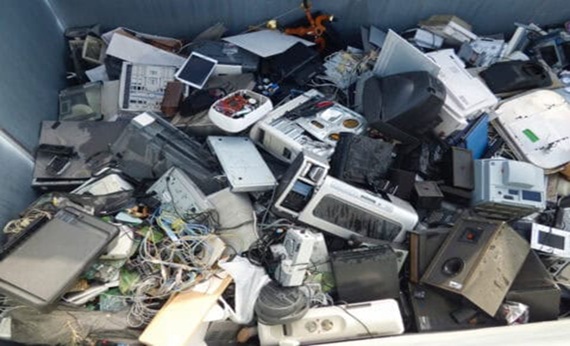In today’s fast-paced digital world, businesses rely heavily on technology to stay competitive. Computers, printers, servers, networking devices, and mobile phones are essential tools in the workplace. But as technology evolves, old devices quickly become obsolete. When this happens, companies are faced with an important question: what counts as e-waste, and how should it be managed responsibly?
This guide explores the definition of e-waste, examples businesses encounter, and best practices for proper disposal.
What is E-Waste?
E-waste, short for electronic waste, refers to any electronic device that is discarded, broken, or no longer in use. These items often contain valuable materials such as copper, aluminum, and gold, but they also contain hazardous components like lead, mercury, and cadmium that can harm the environment if not handled correctly.
For businesses, e-waste extends far beyond outdated laptops or smartphones—it includes nearly any electronic equipment used in daily operations.
Common Types of E-Waste in Businesses
Different industries generate different forms of e-waste. Here are some of the most common items companies often overlook:
-
Office Equipment
- Desktop computers, laptops, keyboards, and monitors.
- Printers, scanners, copiers, and fax machines.
- Desktop computers, laptops, keyboards, and monitors.
-
Networking & IT Infrastructure
- Servers, routers, modems, and switches.
- Cables, power supplies, and storage devices.
- Servers, routers, modems, and switches.
-
Communication Devices
- Company-issued mobile phones and tablets.
- VoIP phones, desk phones, and conferencing equipment.
- Company-issued mobile phones and tablets.
-
Consumer Electronics
- Projectors, televisions, and digital signage.
- Audio and video equipment used in presentations.
- Projectors, televisions, and digital signage.
-
Specialized Business Equipment
- Point-of-sale (POS) systems.
- Medical devices, manufacturing electronics, and lab equipment (depending on industry).
- Point-of-sale (POS) systems.
Why Proper E-Waste Disposal Matters
Simply throwing old electronics into the trash is not just irresponsible—it can also put your business at risk. Here’s why:
- Environmental Protection: Toxic substances in e-waste can contaminate soil and groundwater if sent to landfills.
- Data Security: Retired computers, servers, and hard drives often still contain sensitive business data. Without secure destruction, this information could be exposed.
- Legal Compliance: Many states have e-waste recycling laws. Businesses may face fines if they fail to dispose of electronics properly.
- Corporate Responsibility: Customers and partners expect companies to adopt sustainable practices. Proper e-waste management strengthens your brand reputation.
Best Practices for Managing Business E-Waste
Businesses can reduce risk and promote sustainability by implementing an e-waste strategy. Consider these steps:
Create an Inventory
Keep track of all electronic devices in use, including when they were purchased and their expected lifespan. This helps plan for upgrades and recycling.
Partner with a Certified Recycler
Work with an e-waste recycling company that follows EPA and state guidelines. Certified recyclers ensure electronics are disposed of safely and responsibly.
Prioritize Data Destruction
Before recycling, ensure all data is wiped or destroyed. Look for services offering hard drive shredding or certified data destruction.
Establish a Company Policy
Educate employees on how to properly dispose of old electronics and encourage sustainable practices across the organization.
Consider Reuse & Donation
If devices are still functional, donate them to schools, nonprofits, or community organizations. This extends product life and benefits others.
Final Thoughts
Understanding what counts as e-waste is the first step toward responsible business practices. From old computers and printers to servers and phones, nearly every electronic device in your workplace eventually becomes e-waste. By adopting safe and sustainable disposal methods, businesses can protect the environment, secure sensitive data, and maintain compliance with regulations.
Taking e-waste seriously isn’t just about compliance—it’s about building a more responsible and sustainable future for your business and community.
This post was written by Steven Elia Co-Founder and Recycling Director at eCycle Florida. eCycle Florida is a R2 Certified electronics recycling company in the state of Florida. Our processes and procedures are dedicated to the proper destruction and recycling of your electronics. eCycle Florida is your go-to for commercial e waste.


